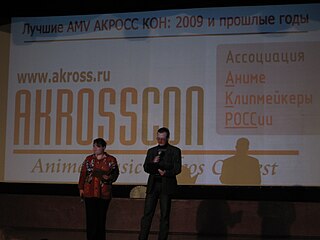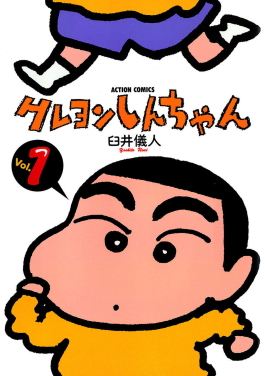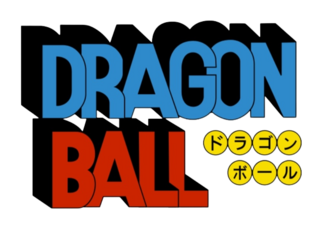See also
- Americanization (immigration)
- Assimilation of immigrants
- Editing of anime in American distribution
Related Research Articles

Dubbing is a post-production process used in filmmaking and video production, often in concert with sound design, in which additional or supplementary recordings (doubles) are lip-synced and "mixed" with original production sound to create the finished soundtrack.

Mobile Suit Gundam, also known as First Gundam, Gundam 0079 or simply Gundam '79, is an anime television series, produced and animated by Nippon Sunrise. Created and directed by Yoshiyuki Tomino, it premiered in Japan on Nagoya Broadcasting Network and its affiliated ANN stations on April 7, 1979, and lasted until January 26, 1980, spanning 43 episodes. It was the first Gundam series, which has subsequently been adapted into numerous sequels and spin-offs. Set in the futuristic calendar year "Universal Century" 0079, the plot focuses on the war between the Principality of Zeon and the Earth Federation, with the latter unveiling a new giant robot known as the RX-78-2 Gundam piloted by the teenage civilian mechanic Amuro Ray.

Voice acting is the art of performing a character or providing information to an audience with one's voice. Performers are called voice actors/actresses, voice artists, dubbing artists, voice talent, voice-over artists, or voice-over talent. Voice acting is recognized as a specialized dramatic profession in the United Kingdom, primarily due to BBC broadcasts of radio drama production.

Astro Boy, known in Japan by its original name Mighty Atom, is a Japanese manga series written and illustrated by Osamu Tezuka. It was serialized in Kobunsha's Shōnen from 1952 to 1968. The 112 chapters were collected into 23 tankōbon volumes by Akita Shoten. Dark Horse Comics published an English translation in 2002. The story follows Astro Boy, an android young boy with human emotions who is created by Umataro Tenma after the recent death of his son Tobio. Eventually, Astro is sold to a robot circus run by Hamegg, but is saved from his servitude by Professor Ochanomizu. Astro becomes a surrogate son to Ochanomizu who creates a robotic family for Astro and helps him to live a normal life like an average human boy, while accompanying him on adventures.
The history of anime in the United States began in 1961, when Magic Boy and The White Snake Enchantress, both produced by Toei Animation, became the first and second anime films to receive documented releases in the country. Anime has since found success with a growing audience in the region, with Astro Boy often being noted as the first anime to receive widespread syndication, especially in the United States. Additionally, anime's growth in popularity in the US during the 1990s, commonly referred to as the "anime boom," is credited with much of anime's enduring relevance to popular culture outside Japan.

Case Closed, also known as Detective Conan, is a Japanese detective manga series written and illustrated by Gosho Aoyama. It has been serialized in Shogakukan's shōnen manga magazine Weekly Shōnen Sunday since January 1994, with its chapters collected in 104 tankōbon volumes as of October 2023. Due to legal problems with the name Detective Conan, the English language releases from Funimation and Viz Media were renamed to Case Closed. The story follows the high school detective Shinichi Kudo, whose body was transformed into that of an elementary school-age child while investigating a mysterious organization. Generally, he solves a multitude of cases by impersonating his childhood best friend's father and various other characters.

An anime music video (AMV) is a fan-made music video consisting of clips from one or more Japanese animated shows or movies set to an audio track, often songs or promotional trailer audio. The term is generally specific to Japanese anime, however, it can occasionally include footage from other mediums, such as American animation, live action, or video games. AMVs are not official music videos released by the musicians, they are fan compositions which synchronize edited video clips with an audio track. AMVs are most commonly posted and distributed over the Internet through AnimeMusicVideos.org, video downloads and YouTube. Anime conventions frequently run AMV contests who usually show the finalists/winner's AMVs.

Crayon Shin-chan is a Japanese manga series written and illustrated by Yoshito Usui. Crayon Shin-chan made its first appearance in 1990 in a Japanese weekly magazine called Weekly Manga Action, which was published by Futabasha. Due to the death of author Yoshito Usui, the manga in its original form ended on September 11, 2009. A new manga began in the summer of 2010 by members of Usui's team, titled New Crayon Shin-chan.

Dragon Ball is a Japanese anime television series produced by Toei Animation that ran for 153 episodes from February 26, 1986, to April 19, 1989, on Fuji TV. The series is an adaptation of the first 194 chapters of the manga series of the same name created by Akira Toriyama, which were published in Weekly Shōnen Jump from 1984 to 1995. It was broadcast in 81 countries worldwide and is the first television series adaptation in the Dragon Ball franchise. The series follows the adventures of Goku, a young boy with a monkey tail and exceptional strength who battles evil-doers in hand-to-hand combat.

Super Milk Chan is a Japanese anime television series directed by Hideyuki Tanaka and produced by Genco, Suplex, framegraphics and Geneon Entertainment for the 24-hour Japanese animation channel called Animax. The show pre-began as 14 eight-minute segment episodes which aired on Fuji Television's Flyer TV block from June 18, 1998 to September 24, 1998 from 24:45 to 24:55, with the animation being produced by Tokyo Kids. The full-length show, entitled OH! Super Milk Chan, ran for 12 twenty-four-minute episodes which was aired on the 24-hour Japanese music channel called Space Shower TV from January 27, 2000 to April 13, 2000 at 19:00 and then 18:00.

Dragon Ball Z: The Tree of Might is a 1990 Japanese anime science fantasy martial arts film and the third Dragon Ball Z feature film. It was originally released in Japan on July 7 between episodes 54 and 55 of DBZ, at the "Toei Anime Fair" film festival, where it was shown as part of an Akira Toriyama-themed triple feature titled Toriyama Akira: The World. It was preceded by Dragon Ball Z: The World's Strongest and followed by Dragon Ball Z: Lord Slug.

Lupin III: The Mystery of Mamo, also known as Lupin III: The Secret of Mamo, is a 1978 Japanese animated science fiction action adventure comedy film. It is the first animated feature film based on the 1967–69 manga series Lupin III by Monkey Punch. The film was originally released in Japan as Lupin III, but was later retitled to Lupin III: Lupin vs. the Clone. Directed by Sōji Yoshikawa, who co-wrote the screenplay with Atsushi Yamatoya, the film was produced by animation studio Tokyo Movie Shinsha and distributed by Toho. The film's plot follows master thief Lupin III, who attempts to foil Mamo ― a wealthy and powerful recluse seeking immortality ― while trying to win the affections of his rival and would-be lover, Fujiko Mine.
The content of Japanese animation (anime) is frequently edited by distributors, both for its release in Japan or during subsequent localizations. This happens for a variety for reasons, including translation, censorship, and remastering.

Viewtiful Joe is an anime series based on the video game series of the same name. The series loosely adapts the first two titles in the series, Viewtiful Joe and Viewtiful Joe 2, while introducing several original characters and scenarios. The series, comprising fifty-one episodes, was shown every Saturday on the Japanese television station TV Tokyo from October 2, 2004, until September 24, 2005. The show was licensed by anime distributor Geneon Entertainment, with its first twenty-six episodes airing in the United States on Kids' WB. It was taken off the air when the block was moved to The CW.

Leo the Lion is a sequel to the Japanese anime television series Jungle Emperor, or Kimba the White Lion. Osamu Tezuka had always wanted his story of Kimba to follow Kimba's entire life, and the Jungle Emperor/Kimba series was such a hit in Japan that Tezuka produced a sequel, without his American partners, in 1966. An English dub of the series was first broadcast in the United States in 1984 on the CBN Cable Network.

Subtitles are texts representing the contents of the audio in a film, television show, opera or other audiovisual media. Subtitles might provide a transcription or translation of spoken dialogue. Although naming conventions can vary, captions are subtitles that include written descriptions of other elements of the audio ,like music or sound effects. Captions are thus especially helpful to people who are deaf or hard-of-hearing. Subtitles may also add information that is not present in the audio. Localizing subtitles provide cultural context to viewers. For example, a subtitle could be used to explain to an audience unfamiliar with sake that it is a type of Japanese wine. Lastly, subtitles are sometimes used for humor, as in Annie Hall, where subtitles show the characters' inner thoughts, which contradict what they were saying in the audio.
The Simpsons is an American animated sitcom broadcast by the Fox Broadcasting Company since 1989. In other countries, the television show started its broadcasts after 1989 either in its original English-language version or in a dubbed version.
Fan translation refers to the unofficial translation of various forms of written or multimedia products made by fans, often into a language in which an official translated version is not yet available. Generally, fans do not have formal training as translators but they volunteer to participate in translation projects based on interest in a specific audiovisual genre, TV series, movie, etc.

Cardcaptor Sakura, abbreviated as CCS, is a Japanese manga series written and illustrated by the manga group Clamp. Serialized monthly in the shōjo manga magazine Nakayoshi from May 1996 to June 2000, it was also published in 12 tankōbon volumes by Kodansha between November 1996 and July 2000. The story centers on Sakura Kinomoto, an elementary school student who discovers magical powers after accidentally freeing a set of magical cards into the world; she must retrieve the cards to prevent catastrophe. Each of these cards grants different magical powers, and can only be activated by someone with inherent magical abilities. A sequel by Clamp, Cardcaptor Sakura: Clear Card, focusing on Sakura in junior high school, began serialization in Nakayoshi in 2016.
References
- Neil Campbell, Jude Davies and George McKay, eds. (2004) Issues in Americanisation and Culture (Edinburgh: Edinburgh University Press). ISBN 0-7486-1943-7.